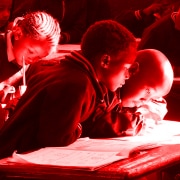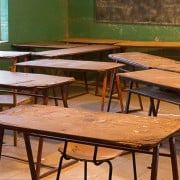|
Getting your Trinity Audio player ready...
|
By Siphokuhle Mkancu – CW Voices
The Eastern Cape (EC) education department has been failing learners in the province’s no-fee schools for years, by not paying over almost two-thirds of subsidies due to these schools, according to a recent media report by GroundUp. This failure accounts for over R872-million not being allocated efficiently to help make the lives of the province’s over 1.8-million learners more bearable. It is one of the latest of scandals that have engulfed the department, but safe to say, it may not be the last.
The reality of the public education system as it pertains to this – one of South Africa’s poorest provinces – is that incompetence and corruption go on for long without punishment, and it is most frequently the children who are enrolled in its public schools that bear the brunt of these ills.
National government’s disregard for the public schooling system cannot be taken lightly. Its impact is deeply felt throughout provinces, in particular, the Eastern Cape, where it has posed a serious threat, even to the right to life. For a period of about a month -from 12 April to 9 May – thousands of learners in the province reportedly went without school-provided meals that were not received due to the provincial education department having failed to make the necessary payments to schools provided for under the National Schools Nutrition Programme. The department has denied that it was negligent, and has instead told the media that the delay in payments was caused when it switched to a new verification process.
The province is already faced with existing threats of malnutrition in children, particularly in underprivileged communities, and they are exacerbated by government’s incompetence in providing basic services consistently. Feeding schemes, provided for under the nutrition programme, are an important element in the overall development of both primary and high school learners from these communities, but are sadly one of the many areas where the department fails.
Mud schools
The department had predicted back in 2018 that it would have eradicated all mud schools in the province by 2022 as per the National Minimum Norms and Standards set by Basic Education Minister, Angie Motshekga. Five months into 2023, and the eradication of these schools continues to move at a snail’s pace.
Even the 2022 deadline that the department had set for itself would’ve been six years later than the Motshekga document had stipulated. The department had said, in the norms and standards, that mud schools and other unsafe structures would be replaced by November 2016, in response to pressure from civil society on government to eliminate mud schools. This is after the Legal Resources Centre (LRC), along with the Centre for Child Law spearheaded the so-called Seven schools case, in which the litigants took the government to court in August 2010, calling for the speedy replacement of mud schools with safer structures. A result of the litigation was that the National Department of Basic Education (DBE) had to sign a memorandum of agreement (MOA)with the LRC that stipulated that it would make funds available to address infrastructure backlogs – R 8.2 billion over three years – and that the EC department of education would provide for provisional educational facilities.
The seven schools involved in the care had consistently tried to get the provincial department to act on the severe infrastructure challenges they were facing, for almost a decade. They were operating in dilapidated mud structures, in some cases with roofs missing and classes being held in informal dwellings, with no running water or sanitation and without adequate chairs and desks for the number of learners in the schools.
Research conducted later by the Centre for Child Law, after the funding was allocated, found that the provincial department had underspent on the grant and that there was no regular reporting on the number of schools and classrooms built as per the MOA.
Pit toilets
As if the challenge to provide safe structures from inside which children can learn was not enough of a failure, there is also a case to be made for the lack of urgency in eradicating pit latrines as well as addressing the lack of access to clean water at schools in the province. In 2021, GroundUp reported that learners in nearly 1 500 EC schools learners were still having to use pit latrines, many of which are derelict and unclean.
The plan for their eradication was informed by the Sanitation Appropriate for Education (Safe) initiative announced for the first time by President Cyril Ramaphosa in 2018, and should have been implemented with the urgency and care that is demonstrated through meaningful service delivery that espouses the principles of the Constitution. It is important to point out that access to education is a human right, and pit latrines demonstrate the inhumane conditions that children are subjected to in schools.
It is also key to note that the level of incompetence so far displayed by the provincial government, as well as its negligence, has costs lives. In March this year, the body of 4-year-old Langalam Viki was found in a school pit latrine. This has again increased calls for the department to develop a thorough plan of action to urgently eradicate pit toilets in all the affected schools.
In the report Broken and Unequal: The State of Education in South Africa, Amnesty International SA found that there are schools that primarily depend on two or three pit latrines across the country. The report rightly argues that for the right to quality, equal basic education to be realised, the government must ensure all schools have access to adequate and safe water and sanitation.
Infrastructure is an integral part of learning and has an impact on learning outcomes. It is also important to point out that this is a socio-economic rights issue – the inequality between the learning environment with pit latrines and other schools that are safer and better equipped.
The crisis in the EC public school system must be placed solely on government’s feet. A child dying from falling into a pit latrine, the deteriorating infrastructure as well as under-resourced schools, are all faults of a government that does not prioritise its immediate service delivery goals for all its citizens, including the children it claims to educate for a better future. It is government that must account for failing to adequately support public schools and for not upholding the right to access quality education.









Leave a Reply